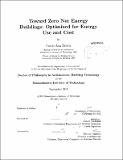Toward zero net energy buildings : optimized for energy use and cost
Author(s)
Brown, Carrie Ann, Ph. D. Massachusetts Institute of Technology
DownloadFull printable version (14.86Mb)
Other Contributors
Massachusetts Institute of Technology. Dept. of Architecture.
Advisor
Leon R. Glicksman.
Terms of use
Metadata
Show full item recordAbstract
Recently, there has been a push toward zero net energy buildings (ZNEBs). While there are many options to reduce the energy used in buildings, it is often difficult to determine which are the most appropriate technologies to implement. To reach zero energy, some designs extensively rely on the use of photovoltaics (PV) to meet the building load, without first exploring the benefits of deep energy efficiency measures. To minimize energy use in a cost effective manner, a tool has been developed to help compare distributed generation (DG) alternatives with energy efficiency measures early in the design process. It was designed to be accessible to non-technical users and to allow them to set up and run simulations in just a few minutes. The tool was built on top of Design Advisor, which provides the capability to analyze a suite of energy efficiency measures such as insulation, window type, schedules, and HVAC types, as well as green and cool roofs. New modules that have been developed for Design Advisor include: heat pumps, absorption chillers, PV, cogeneration, and cost. Using capital cost above baseline as the independent variable, the tool outputs the net annual energy use and total cost (capital and energy) for each case analyzed in the optimization. This allows the user to understand the range of technologies and costs involved along the path from the basecase to a ZNEB.
Description
Thesis (Ph. D. in Building Technology)--Massachusetts Institute of Technology, Dept. of Architecture, 2012. Cataloged from PDF version of thesis. Includes bibliographical references (p. 119-125).
Date issued
2012Department
Massachusetts Institute of Technology. Department of ArchitecturePublisher
Massachusetts Institute of Technology
Keywords
Architecture.